Analysis of the Impact of Values and Perception on Climate Change Skepticism and Its Implication for Public Policy
Abstract
1. Introduction
2. Theoretical Background
2.1. Concepts of Climate Change Skepticism
2.2. Values Versus Perceptions
2.3. Value Factor
2.3.1. Ideology
2.3.2. Environmentalism
2.3.3. Religiosity
2.3.4. Cultural Bias
2.3.5. Science and Technology Optimism
2.4. Perception Factor
2.4.1. Perceived Risk and Benefit
2.4.2. Trust
2.4.3. Negative Affect
2.4.4. Knowledge
3. Sample and Measures
4. Analysis and Findings
4.1. Basic Structure
4.2. Determinant Structure
4.3. Interaction Structure
5. Summary and Implications
Author Contributions
Funding
Acknowledgments
Conflicts of Interest
Appendix A
| Perceived risk (IV) × Religiosity (M) = Skepticism (DV) | Perceived risk (IV) × Individualism (M) = Skepticism (DV) | ||||||||||||
| B | SE | beta | B | SE | beta | B | SE | beta | B | SE | beta | ||
| Perceived risk | −0.144 *** | 0.045 | −0.152 | −0.136 ** | 0.045 | −0.144 | Perceived risk | −0.144 *** | 0.045 | −0.152 | −0.138 ** | 0.045 | −0.146 |
| Religiosity | 0.040 * | 0.019 | 0.068 | 0.033 | 0.02 | 0.056 | Individualism | 0.141 *** | 0.032 | 0.164 | 0.137 *** | 0.031 | 0.16 |
| Interaction rerm | 0.050* | 0.023 | 0.066 | Interaction Term | 0.00 ** | 0.034 | 0.091 | ||||||
| F-value | 24.111 *** | 23.141 *** | F-value | 24.111 *** | 23.521 *** | ||||||||
| R2 | 0.371 | 0.375 | R² square | 0.371 | 0.379 | ||||||||
| R2 change | 0.355 | 0.359 | R² square Change | 0.355 | 0.362 | ||||||||
| Simple slope test | Law | B = −0.195 *** se = 0.057 t = −3.456 | Simple Slope Test | Law | B = −0.220 *** se = 0.051 t = −4.278 | ||||||||
| Middle | B = −0.136 *** se = 0.448 t = −3.039 | Middle | B = −0.138 *** se = 0.045 t = −3.068 | ||||||||||
| High | B = −0.077 se = 0.060 t = −1.274 | High | B = −0.056 *** se = 0.054 t = −1.055 | ||||||||||
| Effect size | 0.004 | Effect Size | 0.008 | ||||||||||
| Perceived benefit (IV) × Individualism (M) = Skepticism (DV) | Trust (IV) × Ideology (M) = Skepticism (DV) | ||||||||||||
| B | SE | beta | B | SE | beta | B | SE | beta | B | SE | beta | ||
| Perceived benefit | −0.094 * | 0.038 | −0.099 | −0.096 * | 0.037 | −0.099 | Trust | 0.006 | 0.039 | 0.005 | 0.004 | 0.039 | 0.004 |
| Individualism | 0.141 *** | 0.032 | 0.164 | 0.138 *** | 0.032 | 0.16 | Ideology | −0.03 * | 0.013 | −0.079 | −0.029 * | 0.013 | −0.078 |
| Interaction term | − | 0.100 ** | 0.034 | 0.088 | Interaction Term | - | −0.043 * | 0.018 | −0.074 | ||||
| F-value | 24.111 *** | 23.477 *** | F-value | 24.111 *** | 23.255 *** | ||||||||
| R2 | 0.371 | 0.378 | R² square | 0.371 | 0.376 | ||||||||
| R2 change | 0.355 | 0.362 | R² square Change | 0.355 | 0.36 | ||||||||
| Simple slope test | Law | B = −0.178 *** se = 0.042 t = −4.203 | Simple Slope Test | Law | B = 0.030 se = 0.041 t = 0.729 | ||||||||
| Middle | B = −0.096 *** se = 0.032 t = −2.982 | Middle | B = 0.004 se = 0.040 t = 0.102 | ||||||||||
| High | B = −0.014 se = 0.042 t = −0.342 | High | B = −0.022 se = 0.041 t = −0.527 | ||||||||||
| Effect size | 0.007 | Effect Size | 0.005 | ||||||||||
| Trust (IV) × Environmentalism (M) = Skepticism (DV) | Negative affect (IV) × Egalitarianism (M) = Skepticism (DV) | ||||||||||||
| B | SE | beta | B | SE | beta | B | SE | beta | B | SE | beta | ||
| Trust | 0.006 | 0.039 | 0.005 | −0.012 | 0.04 | −0.01 | Negative affect | −0.227 *** | 0.046 | −0.242 | −0.227 *** | 0.046 | −0.241 |
| Environmentalism | −0.149 *** | 0.039 | −0.139 | −0.155 *** | 0.039 | −0.146 | Egalitarianism | −0.014 | 0.026 | −0.018 | −0.019 | 0.026 | −0.024 |
| Interaction term | 0.101 * | 0.049 | 0.064 | Interaction Term | − | 0.063 * | 0.028 | 0.07 | |||||
| F-value | 24.111 *** | 23.111 *** | F-value | 24.111’*** | 23.188 *** | ||||||||
| R2 | 0.371 | 0.374 | R² square | 0.371 | 0.375 | ||||||||
| R2 change | 0.355 | 0.358 | R² square Change | 0.355 | 0.359 | ||||||||
| Simple slope test | Law | B = −0.078 se = 0.055 t = −1.479 | Simple Slope Test | Law | B = −0.283 *** se = 0.053 t = −5.368 | ||||||||
| Middle | B = −0.012 se = 0.045 t = −0.267 | Middle | B = −0.227 *** se = 0.0456 t = −4.982 | ||||||||||
| High | B = 0.054 se = 0.055 t = −1.418 | High | B = −0.171 *** se = 0.053 t = −3.222 | ||||||||||
| Effect size | 0.003 | Effect Size | 0.004 | ||||||||||
| Knowledge (IV) × Religiosity (M) = Skepticism (DV) | Knowledge (IV) × Hierarchy (M) = Skepticism (DV) | ||||||||||||
| B | SE | beta | B | SE | beta | B | SE | beta | B | SE | beta | ||
| Knowledge | 0.047 | 0.034 | 0.047 | 0.05 | 0.033 | 0.051 | Knowledge | 0.047 | 0.034 | 0.047 | 0.03 | 0.033 | 0.03 |
| Religiosity | 0.040 * | 0.019 | 0.068 | 0.036 | 0.019 | 0.061 | Hierarchy | 0.159 *** | 0.027 | 0.202 | 0.143 *** | 0.027 | 0.181 |
| Interaction term | 0.064 ** | 0.024 | 0.083 | Interaction Term | 0.155 *** | 0.03 | 0.157 | ||||||
| F-value | 24.111 *** | 23.390 *** | F-value | 24.111 *** | 25.063 *** | ||||||||
| R2 | 0.371 | 0.377 | R² square | 0.371 | 0.394 | ||||||||
| R2 change | 0.355 | 0.361 | R² square Change | 0.355 | 0.378 | ||||||||
| Simple slope test | Law | B = −0.026 se = 0.041 t = −0.627 | Simple Slope Test | Law | B = −0.107 ** se = 0.032 t = −2.419 | ||||||||
| Middle | B = 0.05 se = 0.032 t = 1.582 | Middle | B = 0.03 se = 0.032 t = 0.933 | ||||||||||
| High | B = 0.126 *** se = 0.043 t = 2.923 | High | B = 0.167 *** se = 0.040 t = 4.170 | ||||||||||
| Effect size | 0.006 | Effect Size | 0.020 | ||||||||||
| Knowledge (IV) × Individualism (M) = Skepticism (DV) | |||||||||||||
| B | SE | beta | B | SE | beta | ||||||||
| Knowledge | 0.047 | 0.034 | 0.047 | 0.053 | 0.034 | 0.054 | |||||||
| Individualism | 0.141 *** | 0.032 | 0.164 | 0.130 *** | 0.032 | 0.152 | |||||||
| Interaction term | - | 0.095 ** | 0.033 | 0.09 | |||||||||
| F-value | 24.111 *** | 23.493 *** | |||||||||||
| R2 | 0.371 | 0.378 | |||||||||||
| R2 change | 0.355 | 0.362 | |||||||||||
| Simple slope test | Law | B = 0.024 se = 0.040 t = −0.613 | |||||||||||
| Middle | B = 0.053 se = 0.032 t = 1.678 | ||||||||||||
| High | B = 0.130 *** se = 0.043 t = 3.053 | ||||||||||||
| Effect size | 0.007 | ||||||||||||
References
- Intergovernmental Panel on Climate Change (IPCC). Climate Change 2013: The Physical Science Basis. Contribution of Working Group I to the Fifth Assessment Report of the Intergovernmental Panel on Climate Change; Cambridge University Press: Cambridge, UK; New York, NY, USA, 2013. [Google Scholar]
- Intergovernmental Panel on Climate Change (IPCC). Climate Change 2014: Synthesis Report. Contribution of Working Groups I, II and III to the Fifth Assessment Report of the Intergovernmental Panel on Climate; IPCC: Geneva, Switzerland, 2014; Available online: http://www.ipcc.ch/pdf/assessment-report/ar5/syr/AR5_SYR_FINAL_SPM.pdf (accessed on 1 April 2018).
- European Commission. Special Eurobarometer 409: Climate Change Report. 2014. Available online: http://ec.europa.eu/public_opinion/index_en.htm (accessed on 1 April 2018).
- Riffkin, R. Winter weather to climate change. Politics. 14 March 2016. Available online: http://news.gallup.com/poll/189920 (accessed on 1 April 2018).
- Islam, M.M.; Barnes, A.; Toma, L. An investigation into climate change scepticism among farmers. J. Environ. Psychol. 2013, 34, 137–150. [Google Scholar] [CrossRef]
- Lorenzoni, I.; Pidgeon, N.F. Public views on climate change: European and USA perspectives. Clim. Chang. 2006, 77, 73–95. [Google Scholar] [CrossRef]
- Leiserowitz, A.A.; Maibach, E.W.; Roser-Renouf, C.; Smith, N.; Dawson, E. Climategate public opinion, and the loss of trust. Am. Behav. Sci. 2013, 57, 818–837. [Google Scholar] [CrossRef]
- Pidgeon, N. Public understanding of, and attitudes to, climate change: UK and international perspectives and policy. Clim. Policy 2012, 12, S85–S106. [Google Scholar] [CrossRef]
- Dunlap, R.E. Americans believe 2015 was record-warm, but split on why did it. Politics. 28 March 2016. Available online: http://news.gallup.com/poll/190319 (accessed on 4 April 2018).
- Whitmarsh, L. Scepticism and uncertainty about climate change: Dimensions, determinants and change over time. Glob. Environ. Chang. 2011, 21, 690–700. [Google Scholar] [CrossRef]
- Poortinga, W.; Spence, A.; Whitmarsh, L.; Capstick, S.; Pidgeon, N.F. Uncertain climate: An investigation into public scepticism about anthropogenic climate change. Glob. Environ. Chang. 2011, 21, 1015–1024. [Google Scholar] [CrossRef]
- Akter, S.; Bennett, J.; Ward, M.B. Climate change scepticism and public support for mitigation: Evidence from an Australian choice experiment. Glob. Environ. Chang. 2012, 22, 736. [Google Scholar] [CrossRef]
- Cameron, T.A. Individual option prices for climate change mitigation. J. Public Econ. 2005, 89, 283–301. [Google Scholar] [CrossRef]
- Hobson, K.; Niemeyer, S. “What sceptics believe”: The effects of information and deliberation on climate change scepticism. Public Underst. Sci. (Bristol Engl.) 2013, 22, 396. [Google Scholar] [CrossRef] [PubMed]
- Dunlap, R.E.; McCright, A.M. A widening gap: Republican and democratic views on climate change. Environment 2008, 50, 26–35. [Google Scholar] [CrossRef]
- Hamilton, L.C. Education, politics and opinions about climate change evidence for interaction effects. Clim. Chang. 2011, 104, 231–242. [Google Scholar] [CrossRef]
- Hamilton, L.C.; Cutler, M.J.; Schaefer, A. Public knowledge and concern about polar-region warming. Polar Geogr. 2012, 35, 155–168. [Google Scholar] [CrossRef]
- Leiserowitz, A. Climate change risk perception and policy preferences: The role of affect, imagery, and values. Clim. Chang. 2006, 77, 45–72. [Google Scholar] [CrossRef]
- McCright, A.M.; Dunlap, D.E. The politicization of climate change and polarization in the American public’s views of global warming, 2001–2010. Soc. Psychol. Q. 2011, 52, 155–1194. [Google Scholar] [CrossRef]
- Weber, E.U.; Stern, P.C. Public understanding of climate change in the United States. Am. Psychol. 2011, 66, 315–328. [Google Scholar] [CrossRef]
- Van der Linden, S. The social-psychological determinants of climate change risk perceptions: Towards a comprehensive model. J. Environ. Psychol. 2015, 41, 112–124. [Google Scholar] [CrossRef]
- Capstick, S.B.; Pidgeon, N.F. What is climate change scepticism? examination of the concept using a mixed methods study of the UK public. Glob. Environ. Chang. 2014, 24, 389–401. [Google Scholar] [CrossRef]
- Hansen, J.; Sato, M.; Ruedy, R. Perception of climate change. Proc. Natl. Acad. Sci. USA 2012, 109, E2415–E2423. [Google Scholar] [CrossRef]
- Corner, A.; Whitmarsh, L.; Xenias, D. Uncertainty, scepticism and attitudes towards climate change: Biased assimilation and attitude polarisation. Clim. Chang. 2012, 114, 463–478. [Google Scholar] [CrossRef]
- Dunlap, R.E.; McCright, A.M. Climate change denial: Sources, actors and strategies. In Routledge Handbook of Climate and Society; Tracy, C.L., Ed.; Routledge: Abingdon, UK, 2010; pp. 240–259. [Google Scholar]
- Engels, A.; Hüther, O.; Schäfer, M.; Held, H. Public climate-change skepticism, energy preferences and political participation. Glob. Environ. Chang. 2013, 23, 1018–1027. [Google Scholar] [CrossRef]
- Houlton, S. Unicorns don’t exist: Scepticism over climate change is holding back attempts to take action on climate change. Chem. Ind. 2013, 77, 23. [Google Scholar]
- Tranter, B.; Booth, K. Scepticism in a changing climate: A cross-national study. Glob. Environ. Chang. 2015, 33, 154–164. [Google Scholar] [CrossRef]
- Rahmstorf, S. The Climate Sceptics; Potsdam Institute for Climate Impact Research: Potsdam, Germany, 2004; Available online: http://www.pikpotsdam.de/stefan/Publications/Other/rahmstorf_climate_sceptics_2004. pdf (accessed on 13 April 2018).
- Schwartz, S.H.; Bilsky, W. Toward A universal psychological structure of human values. J. Pers. Soc. Psychol. 1987, 53, 550–562. [Google Scholar] [CrossRef]
- Wolf, J.; Allice, I.; Bell, T. Values, climate change, and implications for adaptation: Evidence from two communities in labrador, canada. Glob. Environ. Chang. 2013, 23, 548–562. [Google Scholar] [CrossRef]
- Sjöberg, L. Risk perception and societal response. In Handbook of Risk Theory; Roeser, S., Hillerbrand, R., Sandin, P., Peterson, M., Eds.; Springer: Amsterdam, The Netherlands, 2012; pp. 661–675. [Google Scholar]
- O’Brien, K.L.; Wolf, J. A values-based approach to vulnerability and adaptation to climate change. Wiley Interdiscip. Rev. Clim. Chang. 2010, 1, 232–242. [Google Scholar] [CrossRef]
- Slovic, P. The Perception of Risk; Routledge: London, UK, 2016. [Google Scholar]
- Starr, C. Social benefit versus technological risk. Science 1969, 165, 1232–1238. [Google Scholar] [CrossRef] [PubMed]
- Slovic, P. Perceptions of Risk: Reflections on the Psychometric Paradigm. In Theories of Risk; Goldingk, D., Krimsky, S., Eds.; Praeger: New York, NY, USA, 1990. [Google Scholar]
- Kahan, D.; Peters, E.; Wittlin, M.; Slovic, P.; Ouellette, L.L.; Braman, D.; Mandel, G. The polarizing impact of scientific literacy and numeracy on perceived climate change risk. Nat. Clim. Chang. 2012, 2, 732–735. [Google Scholar] [CrossRef]
- Stevenson, K.T.; Peterson, M.N.; Bondell, H.D.; Moore, S.E.; Carrier, S.J. Overcoming skepticism with education: Interacting influences of worldview and climate change knowledge on perceived climate change risk among adolescents. Clim. Chang. 2014, 126, 293–304. [Google Scholar] [CrossRef]
- Corner, A. Do Climate Change Sceptics Give Scepticism a Bad Name? The Guardian. 2010. Available online: www.guardian.co.uk/environment/blog/2010/feb/22/climate-changesceptics (accessed on 25 April 2018).
- Zhou, M. Public environmental skepticism: A cross-national and multilevel analysis. Int. Sociol. 2015, 30, 61–85. [Google Scholar] [CrossRef]
- Ziegler, A. Political orientation, environmental values, and climate change beliefs and attitudes: An empirical cross country analysis. Energy Econ. 2017, 63, 144–153. [Google Scholar] [CrossRef]
- Perera, L.C.R.; Hewege, C.R. Climate change risk perceptions and environmentally conscious behaviour among young environmentalists in Australia. Young Consum. 2013, 14, 139–154. [Google Scholar] [CrossRef]
- Gauchat, G. Politicization of science in the public sphere: A study of public trust in the United States, 1974 to 2010. Am. Sociol. Rev. 2012, 77, 167–187. [Google Scholar] [CrossRef]
- Ecklund, E.H.; Scheitle, C.P.; Peifer, J.; Bolger, D. Examining links between religion, evolution views, and climate change skepticism. Environ. Behav. 2016, 49, 985–1006. [Google Scholar] [CrossRef]
- Sun, Y.; Han, Z. Religious believers have higher risk perceptions of personal threat than non-religious people. Int. J. Environ. Res. Public Health 2018, 15, 91. [Google Scholar] [CrossRef] [PubMed]
- McCright, A.M.; Marquart-Pyatt, S.T.; Shwom, R.L.; Brechin, S.R.; Allen, S. Ideology, capitalism, and climate: Explaining public views about climate change in the united states. Energy Res. Soc. Sci. 2016, 21, 180–189. [Google Scholar] [CrossRef]
- Douglas, M.; Wildavsky, A. Risk and Culture; University of California Press: Berkeley, CA, USA, 1982. [Google Scholar]
- Rudiak-Gould, P. Cross-cultural insights into climate change skepticism. Bull. Am. Meteorol. Soc. 2013, 94, 1707–1713. [Google Scholar] [CrossRef]
- Shi, J.; Visschers, V.H.M.; Siegrist, M. Public perception of climate change: The importance of knowledge and cultural worldviews. Risk Anal. 2015, 35, 2183–2201. [Google Scholar] [CrossRef] [PubMed]
- Kahan, D.M.; Jenkins-Smith, H.; Braman, D. Cultural Cognition of Scientific Consensus. Cultural Cognition Project Working Paper, No. 77. 2010. Available online: http://papers.ssrn.com/sol3/papers.cfm?abstract_id =1549444 (accessed on 1 April 2018).
- Sjöberg, L. World views, political attitudes and risk perception. Risk Health Saf. Environ. 1998, 9, 137. [Google Scholar]
- Sjöberg, L. Explaining risk perception: An empirical evaluation of cultural theory. Risk Decis. Policy 1997, 2, 113–130. [Google Scholar] [CrossRef]
- Gifford, R. The dragons of inaction: Psychological barriers that limit climate change mitigation and adaptation. Am. Psychol. 2011, 66, 290–302. [Google Scholar] [CrossRef]
- Costa-Font, J.; Mossialos, E.; Rudisill, C. Optimism and the perceptions of new risks. J. Risk Res. 2009, 12, 27–41. [Google Scholar] [CrossRef]
- Lorenzoni, I. Present Choices, Future Climates: A Cross-cultural Study of Perceptions in Italy and in the UK. Ph.D. Thesis, School of Environmental Sciences, University of East Anglia, Norwich, UK, 2003. [Google Scholar]
- Mase, A.S.; Gramig, B.M.; Prokopy, L.S. Climate change beliefs, risk perceptions, and adaptation behavior among Midwestern U.S. crop farmers. Clim. Risk Manag. 2017, 15, 8–17. [Google Scholar] [CrossRef]
- Akerlof, K.; Maibach, E.W.; Fitzgerald, D.; Cedeno, A.Y.; Neuman, A. Do people “personally experience” global warming, and if so how, and does it matter? Glob. Environ. Chang. 2013, 23, 81–91. [Google Scholar] [CrossRef]
- Niles, M.T.; Lubell, M.; Haden, V.R. Perceptions and responses to climate policy risks among California farmers. Glob. Environ. Chang. 2013, 23, 1752. [Google Scholar] [CrossRef]
- Siegrist, M.; Cvetkovich, G.; Roth, C. Salient value similarity, social trust, and risk/benefit perception. Risk Anal. 2000, 20, 353–362. [Google Scholar] [CrossRef] [PubMed]
- Hmielowski, J.D.; Feldman, L.; Myers, T.A.; Leiserowitz, A.; Maibach, E. An attack on science? media use, trust in scientists, and perceptions of global warming. Public Underst. Sci. 2014, 23, 866–883. [Google Scholar] [CrossRef] [PubMed]
- Slovic, P.; Finucane, M.L.; Peters, E.; MacGregor, D.G. The affect heuristic. Eur. J. Oper. Res. 2007, 177, 1333–1352. [Google Scholar] [CrossRef]
- Smith, N.; Leiserowitz, A. The rise of global warming skepticism: Exploring affective image associations in the united states over time. Risk Anal. 2012, 32, 1021–1032. [Google Scholar] [CrossRef] [PubMed]
- Dunlap, R.E. Climate change skepticism and denial: An introduction. Am. Behav. Sci. 2013, 57, 691–698. [Google Scholar] [CrossRef]
- Persson, J.; Sahlin, N.; Wallin, A. Climate change, values, and the cultural cognition thesis. Environ. Sci. Policy 2015, 52, 1–5. [Google Scholar] [CrossRef]
- Siegrist, M. A causal model explaining the perception and acceptance of gene technology. J. Appl. Soc. Psychol. 1999, 29, 2093–2106. [Google Scholar] [CrossRef]
- Van Liere, K.D.; Dunlap, R.E. The social bases of environmental concern: A review of hypotheses, explanations and empirical evidence. Public Opin. Q. 1982, 46, 292. [Google Scholar] [CrossRef]
- Maslow, A.H. Motivation and Personality, 2nd ed.; Harper & Row: New York, NY, USA, 1970. [Google Scholar]
- Kahan, D. Fixing the communications failure. Nature 2010, 463, 296–297. [Google Scholar] [CrossRef] [PubMed]
- Baron, R.M.; Kenny, D.A. The moderator—Mediator variable distinction in social psychological research: Conceptual, strategic, and statistical considerations. J. Pers. Soc. Psychol. 1986, 51, 1173–1182. [Google Scholar] [CrossRef] [PubMed]
- Löschel, A.; Sturm, B.; Vogt, C. The demand for climate protection—Empirical evidence from germany. Econ. Lett. 2013, 118, 415–418. [Google Scholar] [CrossRef]
- Morrison, M.; Duncan, R.; Parton, K. Religion does matter for climate change attitudes and behavior. PLoS ONE 2015, 10, e0134868. [Google Scholar] [CrossRef] [PubMed]
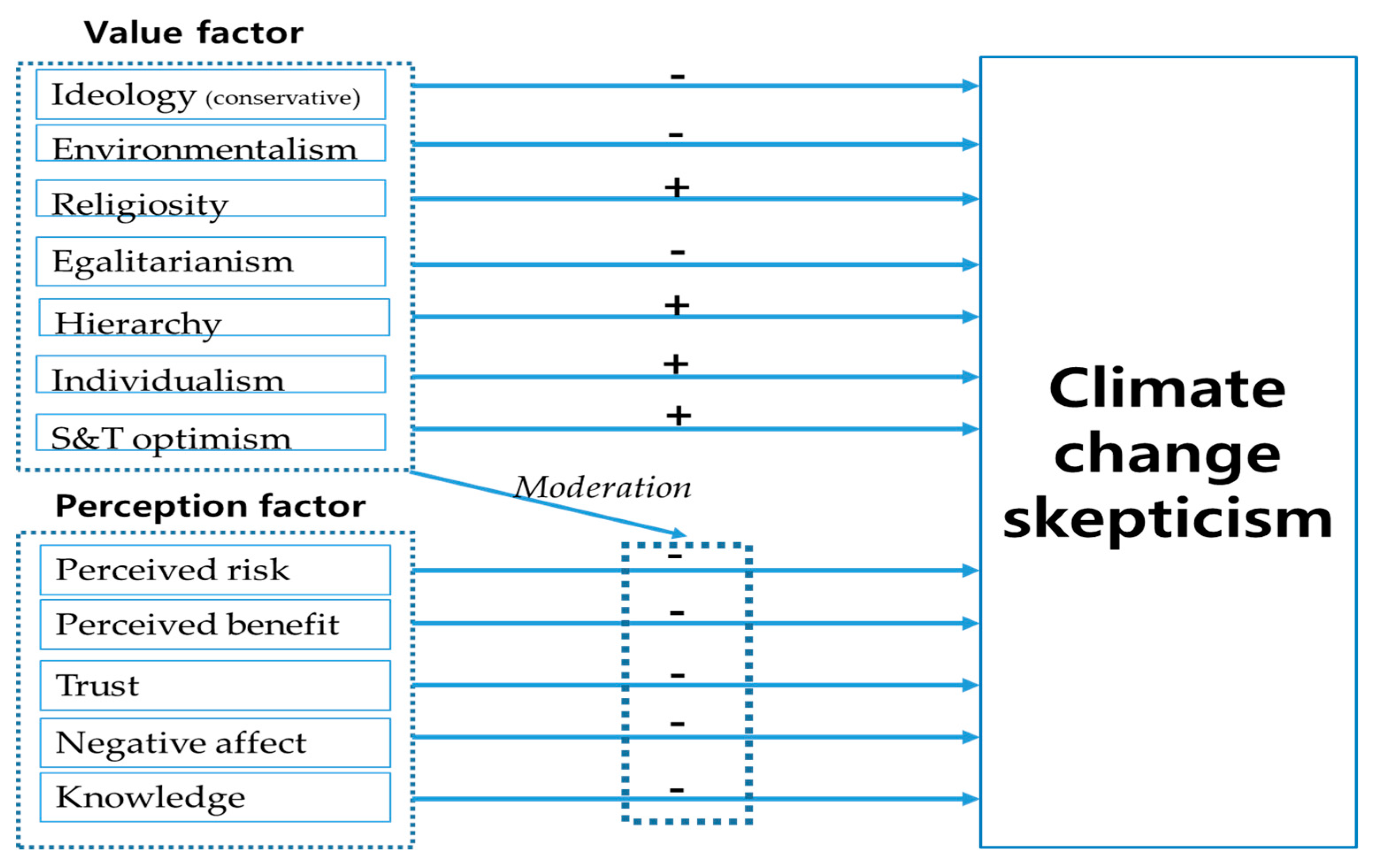
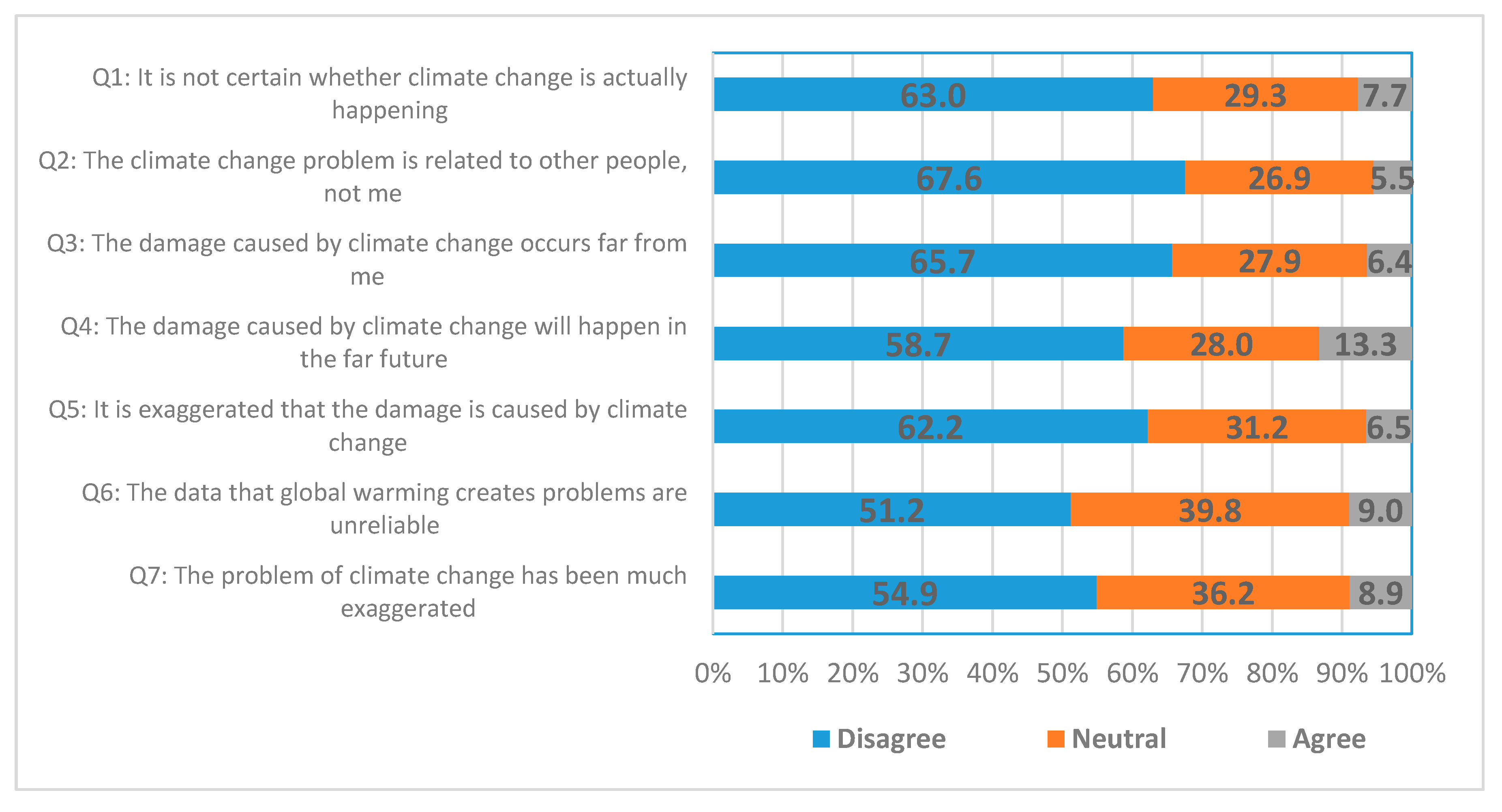
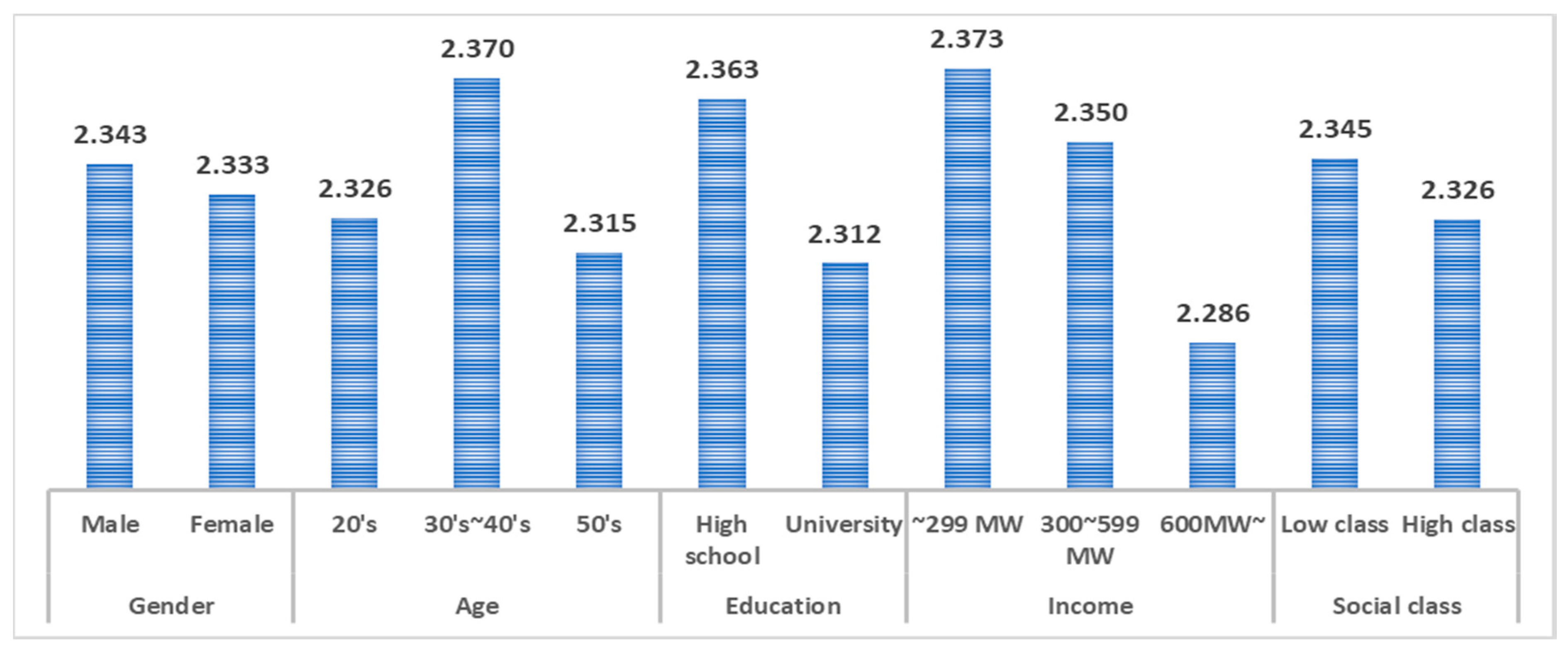
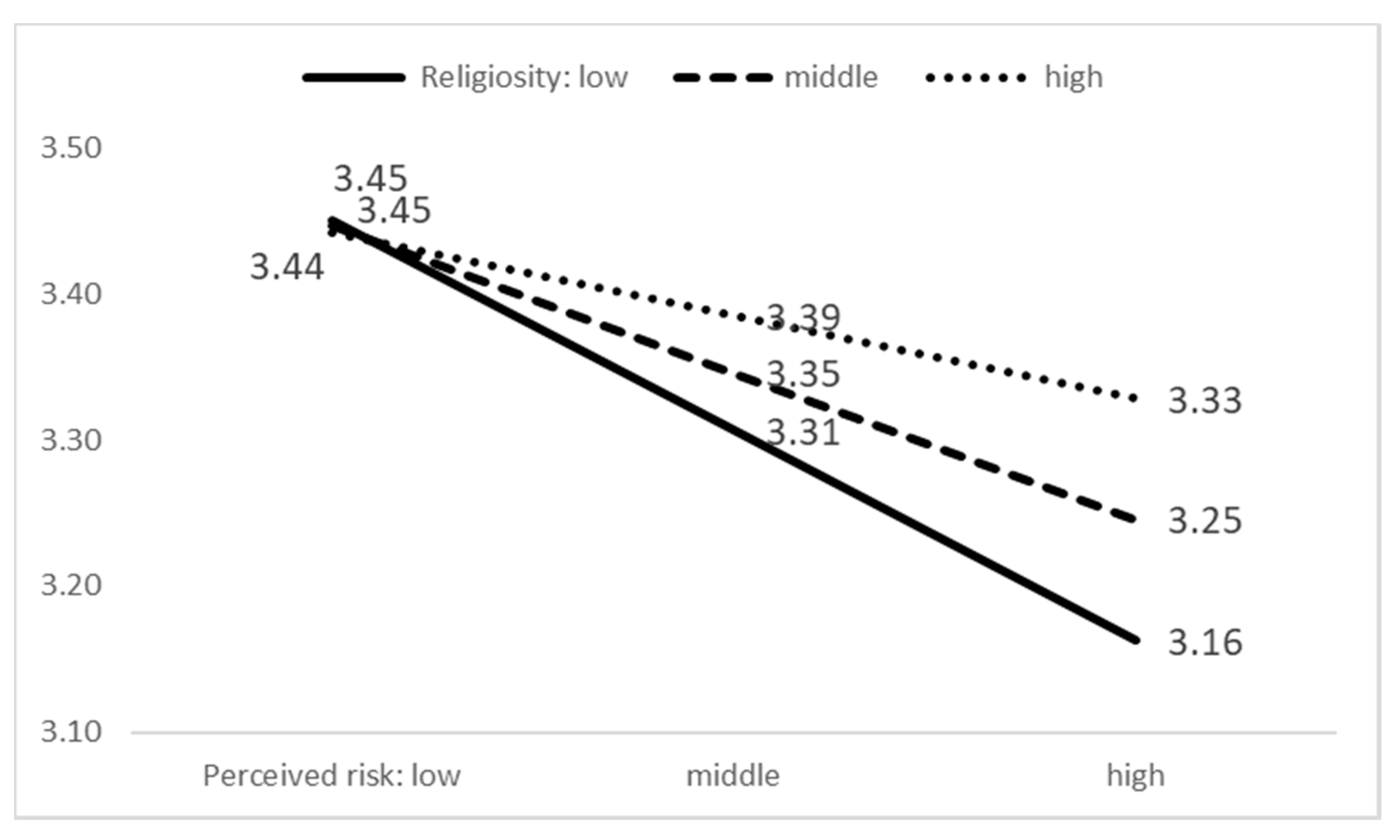
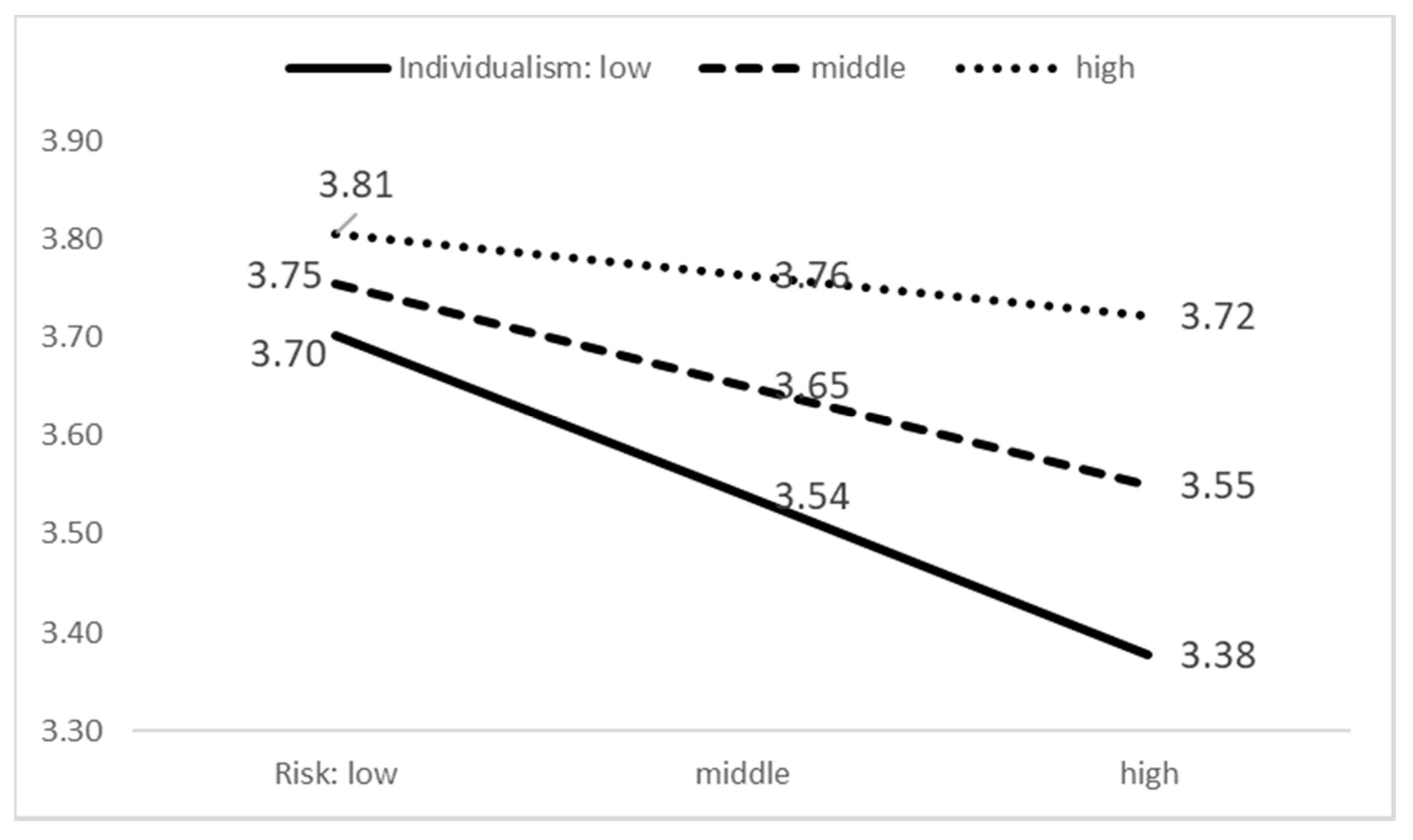
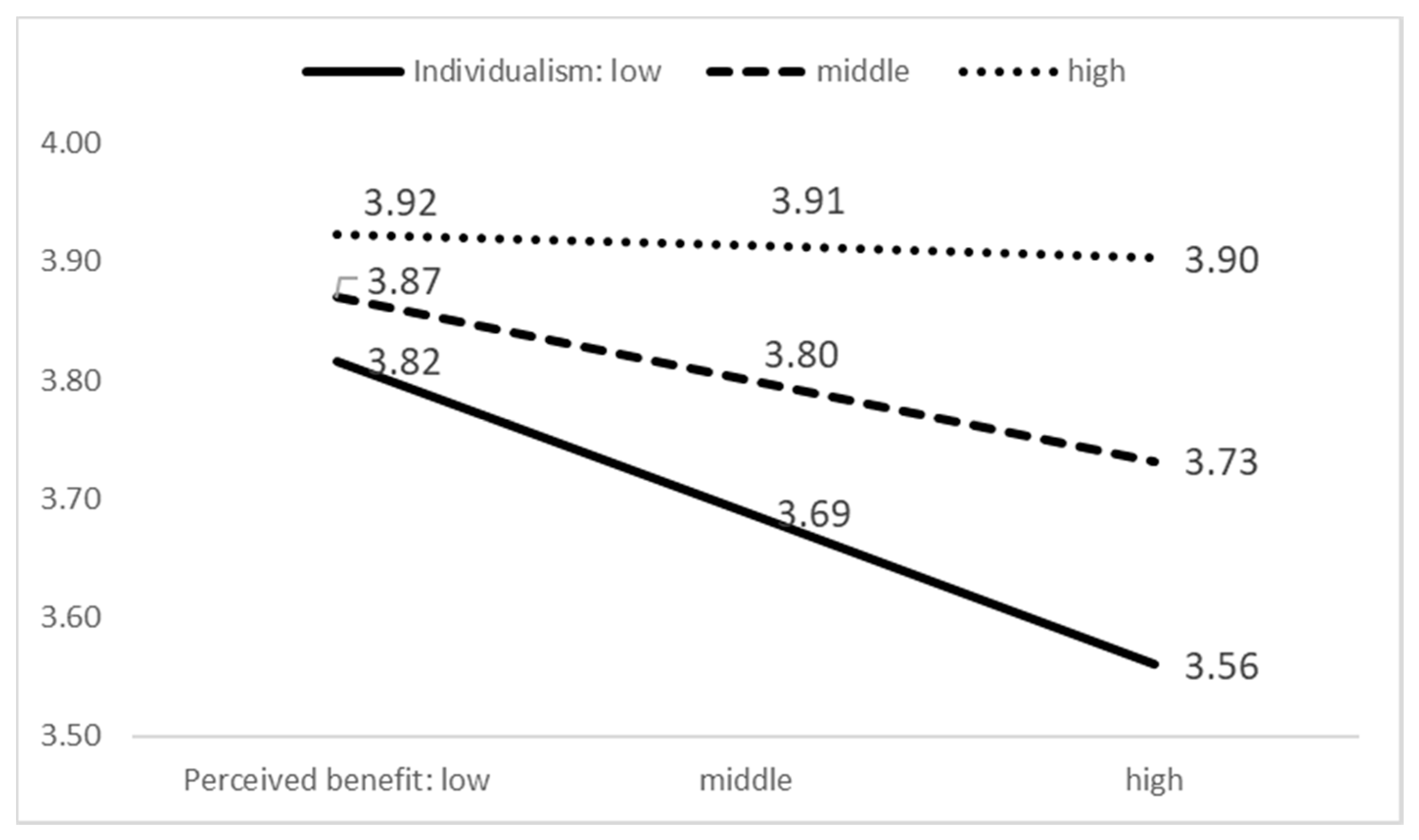
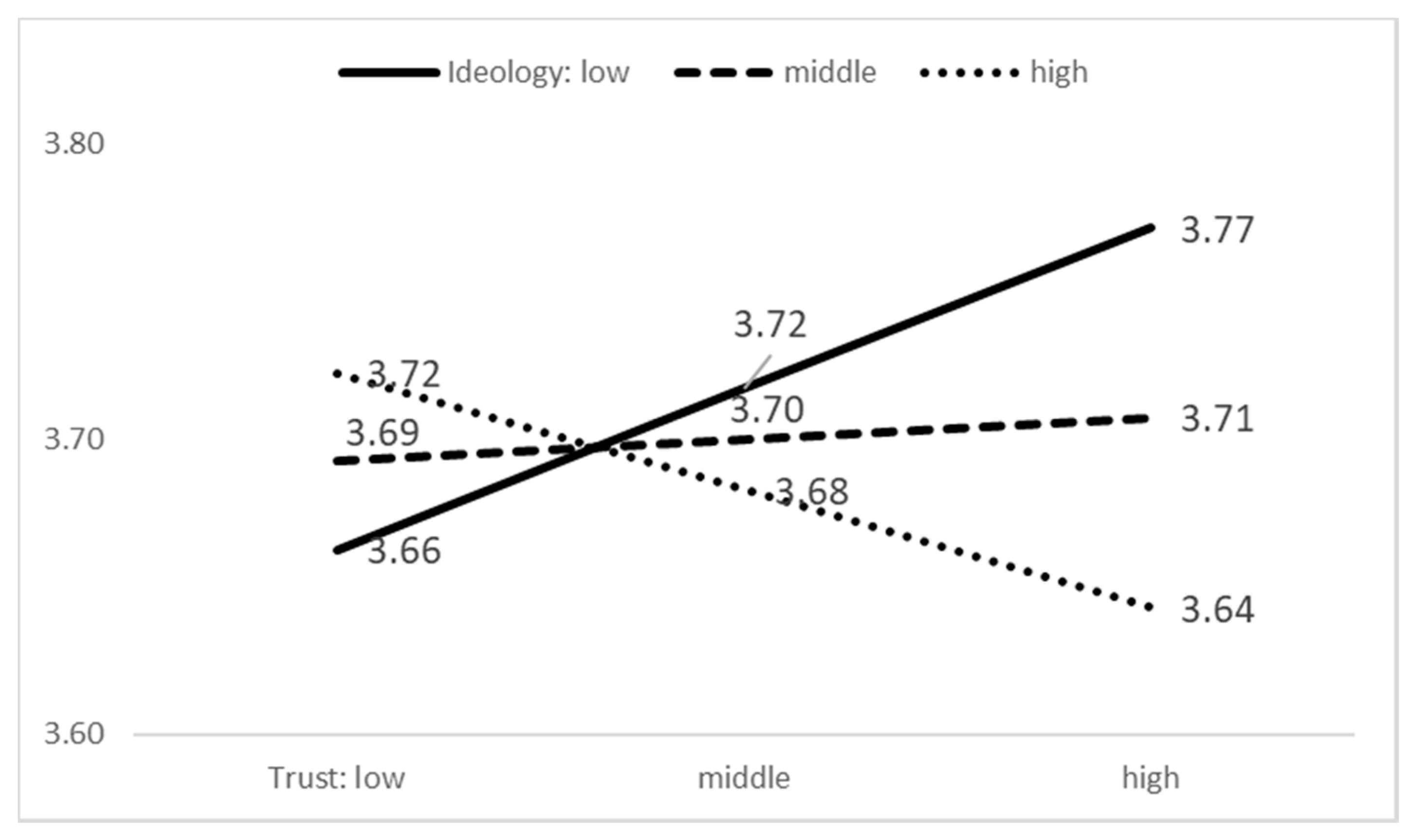
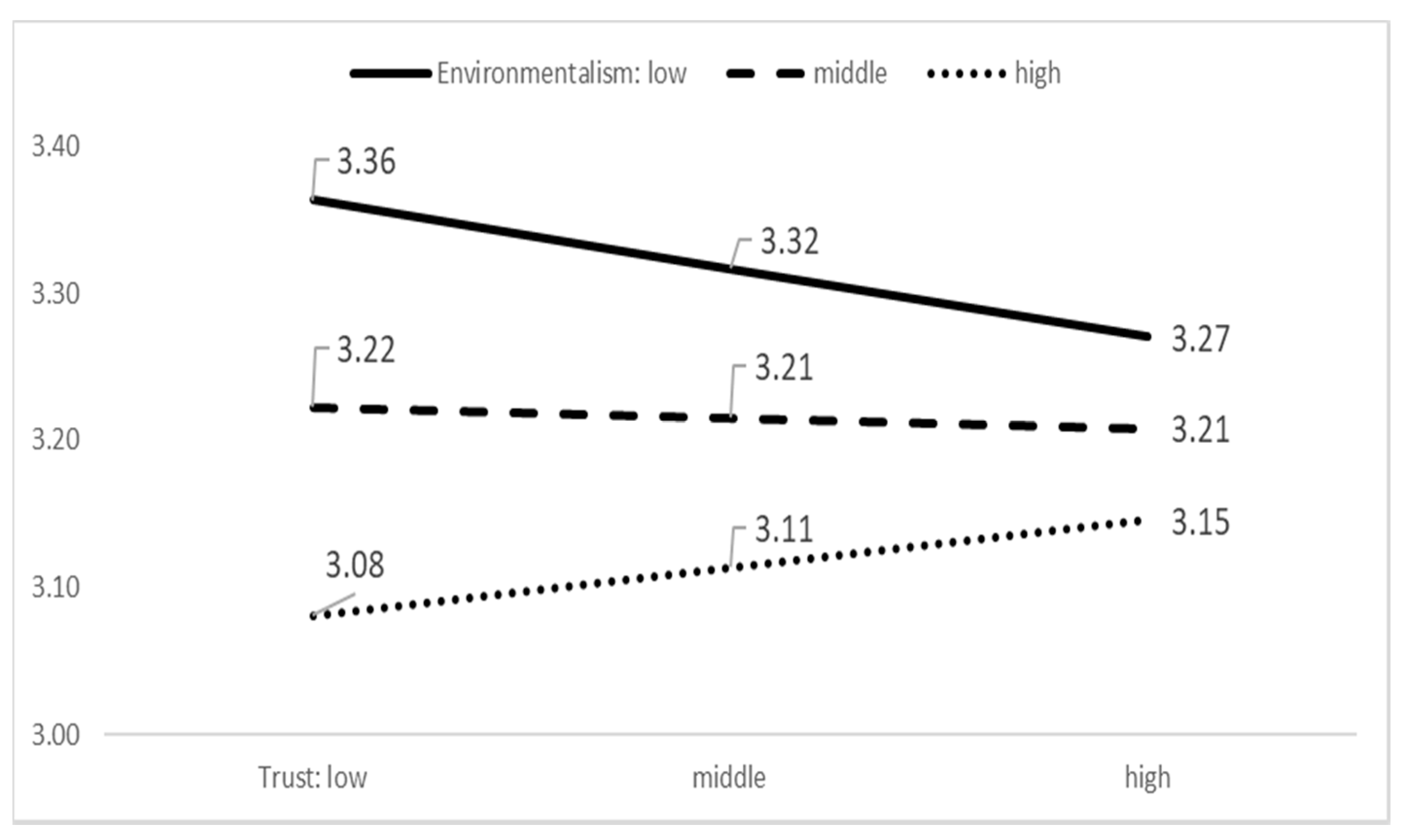

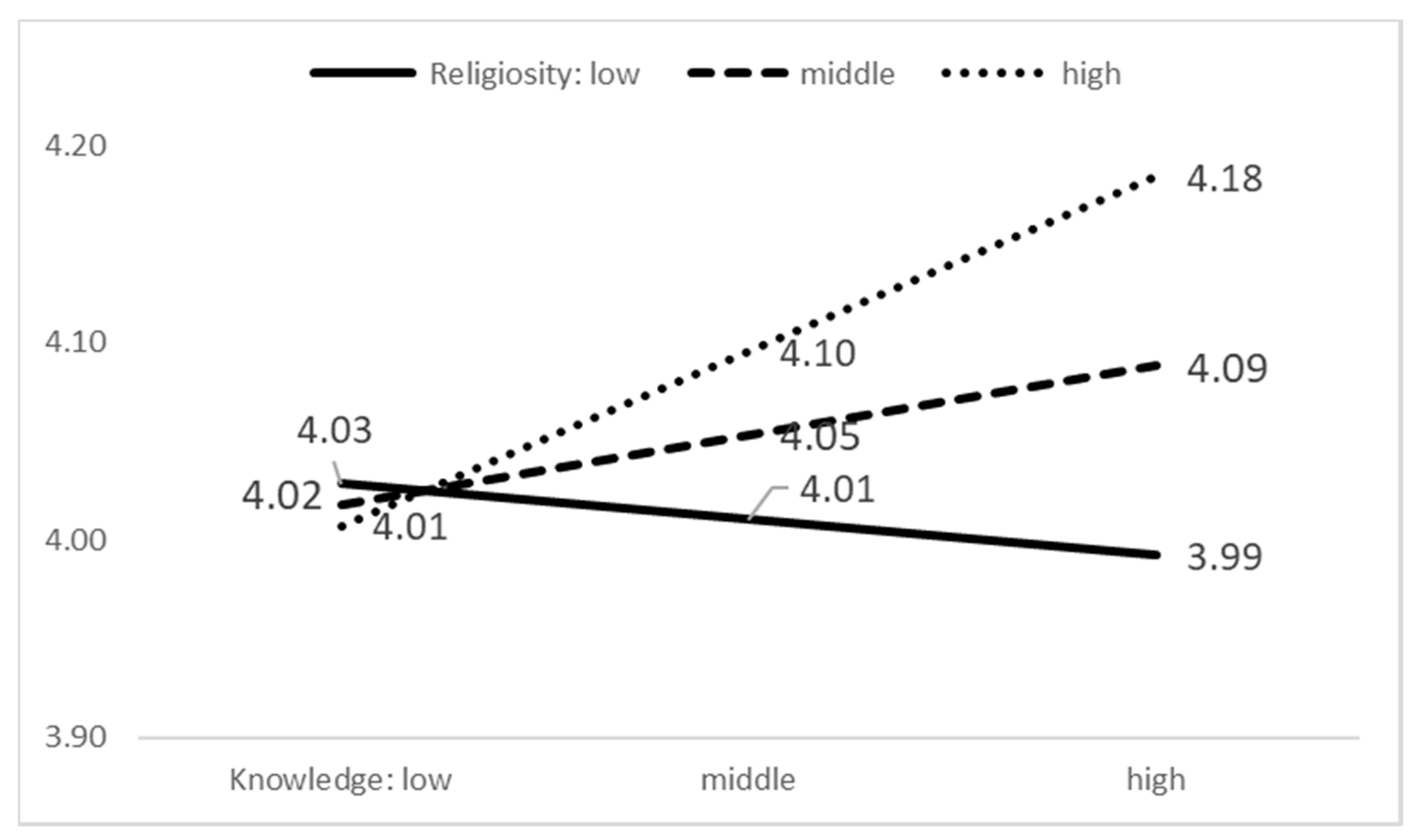
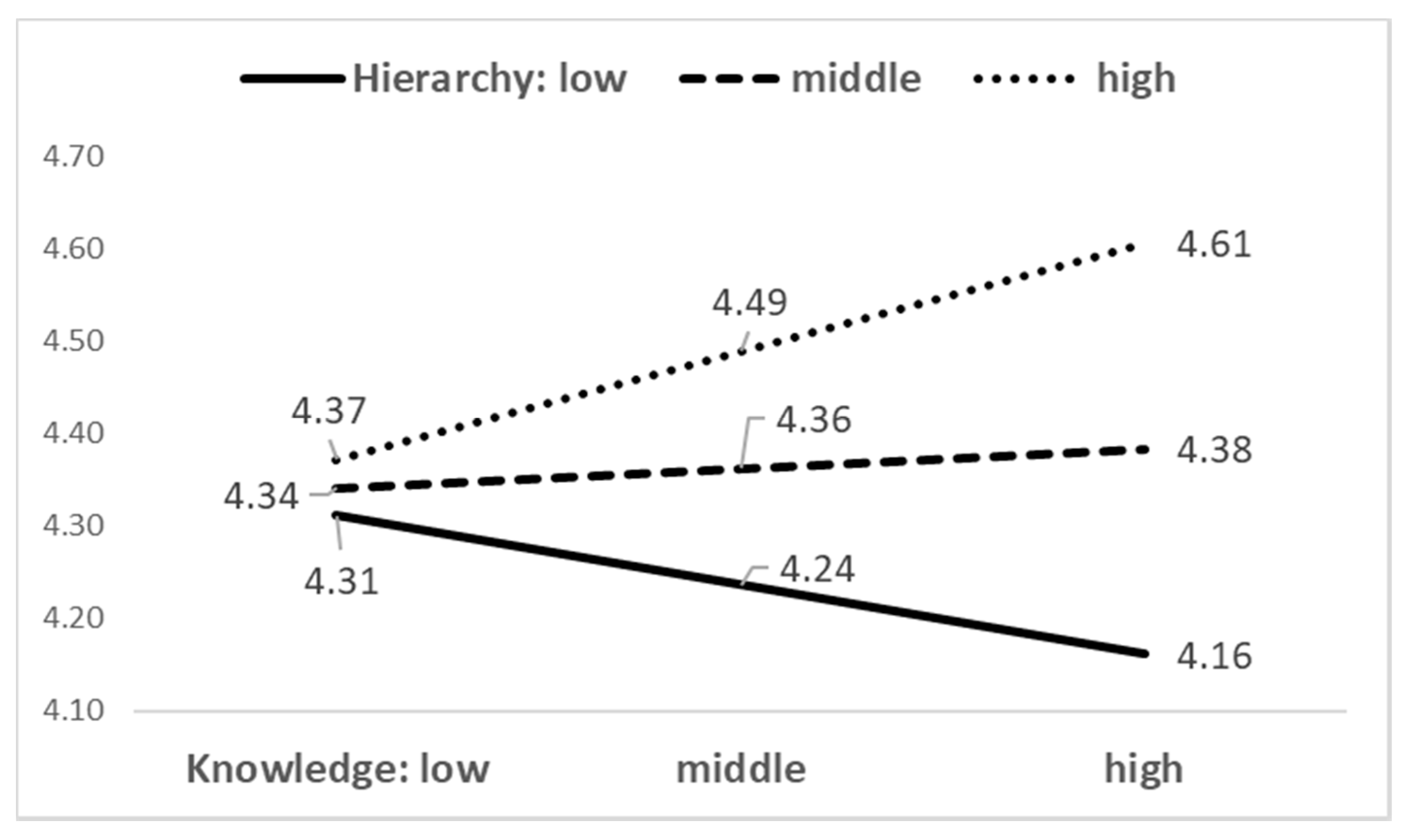
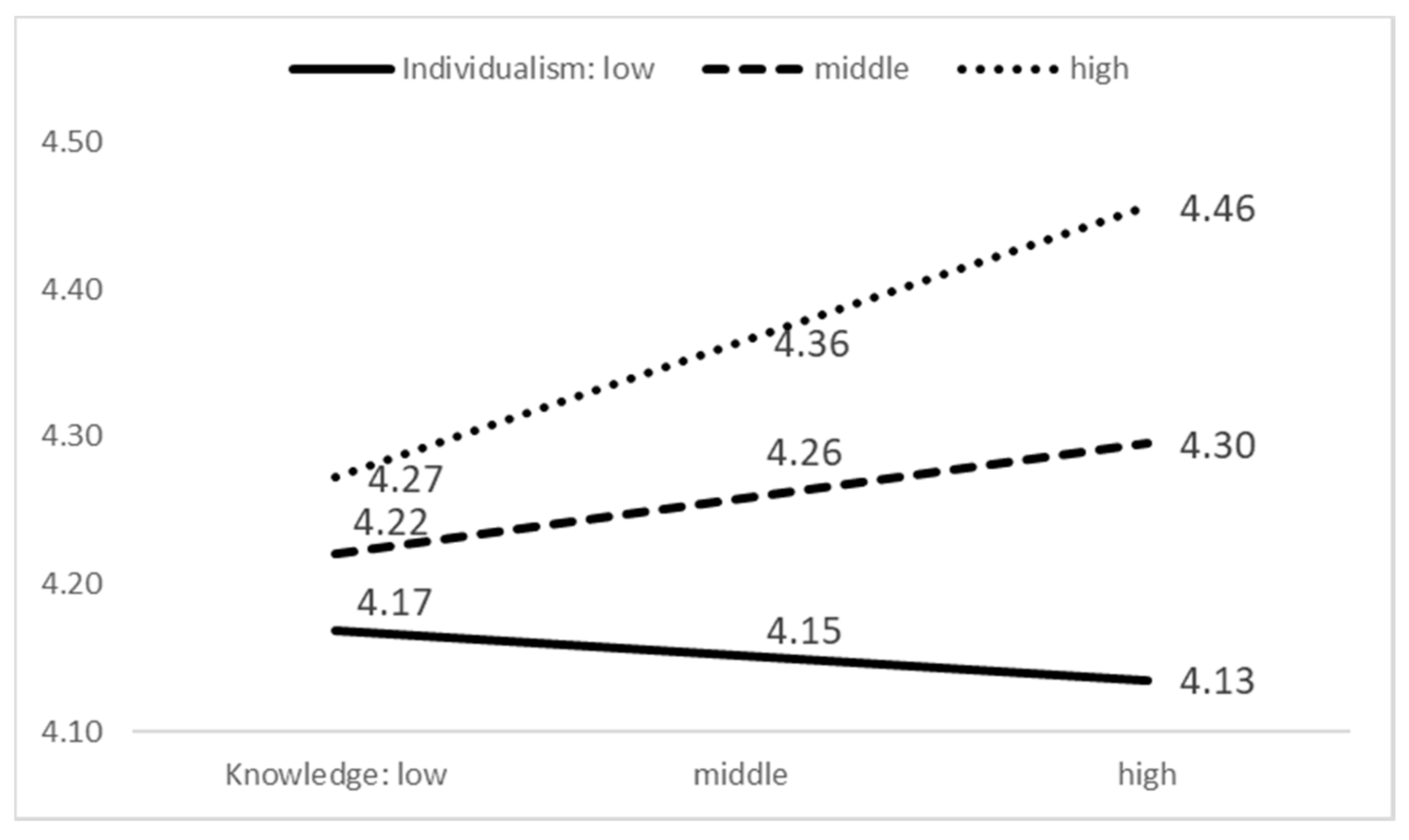
| Concept | Measures | Reliability |
|---|---|---|
| Climate Change Skepticism | - The problem of climate change is much exaggerated - The data that global warming creates problems are unreliable - It is exaggerated that the damage is caused by climate change - The damage caused by climate change will happen in the far future - The damage caused by climate change occurs far from me - The climate change problem is related to other people, not me - It is not certain whether climate change is actually happening | 0.921 |
| Religiosity | - I am religious - I am convinced of the existence of God | 0.877 |
| Environmentalism | - Currently, the earth faces a serious environmental and ecological crisis - The earth already surpassed its limitations - Animals and plants have as much of a right to live as human beings - Since nature is very sensitive, it is easily destroyed | 0.768 |
| Egalitarianism | - Our society needs overall reform to distribute wealth equally - We need overall revolution to make the wealth equally distributed | 0.790 |
| Hierarchy | - Our society is confused because authority is disregarded - Strong laws create a good society | 0.505 |
| Individualism | - People are poor because they do not try hard enough - A competing society is a good society | 0.582 |
| S&T optimism | - Science and technology (S&T) solve more problems than they create - Science and technology perform more positive functions than negative ones | 0.657 |
| Perceived risk | - Climate change is a serious threat to the survival of humankind - Planetary changes due to global warming will cause me a lot of damage - I am worried that the problems caused by global warming will be harmful for humans | 0.910 |
| Perceived benefit | - If climate change problems are resolved, there will be tremendous benefits - Solving climate change will lead to economic development | 0.839 |
| Trust | - How much do you trust the following organizations in addressing climate change and energy issues? 1. University research institutes, 2. Environmental protection organizations, 3. Consumer organizations, 4. Press, 5. Government, 6. Private companies, 7. Energy companies, 8. Scientists | 0.817 |
| Negative affect | - I am sad to see climate change due to climate global warming - I am worried about climate change due to global warming - I am afraid of climate change due to global warming | 0.912 |
| Knowledge | - I know the problems of climate change well - I am more knowledgeable about climate change than others | 0.839 |
| Statement | Factor | |||
|---|---|---|---|---|
| 1 | 2 | 3 | ||
| Egalitarianism | We need overall revolution to make the wealth equally distributed | 0.902 | −0.080 | 0.038 |
| If our society is equalized, many problems will be solved | 0.901 | −0.026 | 0.102 | |
| Individualism | A competing society is a good society | −0.004 | 0.876 | 0.075 |
| People are poor because they do not try hard enough | −0.106 | 0.766 | 0.255 | |
| Hierarchy | Our society is confused because authority is disregarded | −0.024 | 0.146 | 0.834 |
| Strong laws create a good society | 0.170 | 0.153 | 0.759 | |
| 1 | 2 | 3 | 4 | 5 | 6 | 7 | 8 | 9 | 10 | 11 | 12 | 13 | ||
|---|---|---|---|---|---|---|---|---|---|---|---|---|---|---|
| 1. Skepticism | 1 | 0.081 ** | −0.344 *** | 0.106 *** | −0.102 *** | 0.282 *** | 0.261 *** | 0.104 *** | −0.441 *** | −0.338 *** | −0.071 *** | −0.460 *** | −0.072 * | |
| Value factor | 2. Ideology (progressive) | 0.073 * | 1 | −0.131 *** | 0.122 *** | −0.23 ***4 | 0.162 *** | 0.230 *** | 0.003 | −0.120 *** | −0.103 *** | 0.015 | −0.155 *** | −0.142 *** |
| 3. Environmentalism | −0.347 *** | −0.122 *** | 1 | −0.038 | 0.252 *** | 0.016 | −0.016 | 0.070 * | 0.499 *** | 0.354 *** | 0.022 | 0.455 *** | 0.157 *** | |
| 4. Religiosity | 0.093 ** | 0.164 *** | −0.029 | 1 | −0.017 | 0.166 *** | 0.163 *** | 0.048 | 0.057 | 0.074 ** | −0.158 *** | 0.010 | 0.052 | |
| 5. Egalitarianism | −0.105 *** | −0.224 *** | 0.249 *** | −0.023 | 1 | 0.148 *** | −0.105 *** | 0.136 *** | 0.181 *** | 0.179 *** | −0.132 *** | 0.194 *** | 0.103 *** | |
| 6. Hierarchy | 0.282 *** | 0.170 *** | 0.020 | 0.160 *** | 0.147 *** | 1 | 0.373 *** | 0.241 *** | −0.033 | 0.018 | −0.134 *** | −0.036 | 0.041 | |
| 7. Individualism | 0.237 *** | 0.284 *** | −0.020 | 0.204 *** | −0.104 *** | 0.359 *** | 1 | 0.241 **** | −0.047 | −0.005 | −0.228 *** | −0.042 | 0.026 | |
| 8. S&T optimism | 0.096 ** | 0.020 | 0.062 | 0.062 * | 0.136 *** | 0.232 *** | 0.261 *** | 1 | 0.071 | 0.138 *** | −0.255 *** | 0.079 ** | 0.123 *** | |
| Perception factor | 9. Perceived risk | −0.440 *** | −0.085 ** | 0.498 *** | 0.083 ** | 0.174 *** | −0.026 | −0.002 | 0.078 ** | 1 | 0.539 *** | −0.015 | 0.735 *** | 0.221 *** |
| 10. Perceived benefit | −0.337 *** | −0.078 ** | 0.350 *** | 0.096 ** | 0.172 *** | 0.019 | 0.029 | 0.146 *** | 0.544 *** | 1 | 0.107 *** | 0.585 *** | 0.263 *** | |
| 11. Trust | −0.067 * | −0.038 | 0.021 | −0.209 *** | −0.114 *** | −0.136 *** | −0.281 *** | −0.262 *** | −0.016 | −0.128 *** | 1 | 0.047 | 0.090 ** | |
| 12. Negative affect | −0.457 *** | −0.124 *** | 0.455 *** | 0.056 | 0.177 *** | −0.035 | −0.009 | 0.182 *** | 0.735 *** | 0.587 *** | 0.080 ** | 10.000 | 0.283 *** | |
| 13. Knowledge | −0.070 * | −0.121 *** | 0.128 *** | 0.077 ** | 0.074 ** | 0.019 | 0.076 ** | 0.147 *** | 0.218 *** | 0.269 *** | 0.120 *** | 0.286 *** | 1 |
| B | SE | Beta | t | Sig. | ||
|---|---|---|---|---|---|---|
| Constant | 3.782 | 0.297 | 12.727 | 0.000 | ||
| F1: Sociodemographic factor | Gender (female) | 0.068 | 0.044 | 0.049 | 1.535 | 0.125 |
| Age | −0.003 | 0.002 | −0.065 | −1.841 | 0.066 | |
| Education level | −0.060 | 0.049 | −0.043 | −1.231 | 0.219 | |
| Income | −0.125 | 0.057 | −0.080 | −2.181 | 0.030 | |
| Social class | 0.028 | 0.017 | 0.062 | 1.603 | 0.109 | |
| F2: Value factor | Ideology (Progressive) | −0.030 | 0.013 | −0.079 | −2.375 | 0.018 |
| Environmentalism | −0.149 | 0.039 | −0.139 | −3.850 | 0.000 | |
| Religiosity | 0.040 | 0.019 | 0.068 | 2.061 | 0.040 | |
| Egalitarianism | −0.014 | 0.026 | −0.018 | −0.550 | 0.582 | |
| Hierarchy | 0.159 | 0.027 | 0.202 | 5.892 | 0.000 | |
| Individualism | 0.141 | 0.032 | 0.164 | 4.448 | 0.000 | |
| S&T optimism | 0.066 | 0.033 | 0.067 | 2.020 | 0.044 | |
| F3: Psychometric factor | Perceived risk | −0.144 | 0.045 | −0.152 | −3.197 | 0.001 |
| Perceived benefit | −0.096 | 0.038 | −0.099 | −2.559 | 0.011 | |
| Trust | 0.006 | 0.039 | 0.005 | 0.155 | 0.877 | |
| Negative affect | −0.227 | 0.046 | −0.242 | −4.948 | 0.000 | |
| Knowledge | 0.047 | 0.034 | 0.047 | 1.396 | 0.163 | |
| F-value | 24.111 *** | |||||
| R2/Adjusted R2 | 0.371/0.355 | |||||
| F1: R2/Adjusted R2 | 0.014/0.007 | |||||
| F2: R2/Adjusted R2 | 0.229/0.221 | |||||
| F3: R2/Adjusted R2 | 0.250/0.245 | |||||
© 2018 by the authors. Licensee MDPI, Basel, Switzerland. This article is an open access article distributed under the terms and conditions of the Creative Commons Attribution (CC BY) license (http://creativecommons.org/licenses/by/4.0/).
Share and Cite
Wang, J.; Kim, S. Analysis of the Impact of Values and Perception on Climate Change Skepticism and Its Implication for Public Policy. Climate 2018, 6, 99. https://doi.org/10.3390/cli6040099
Wang J, Kim S. Analysis of the Impact of Values and Perception on Climate Change Skepticism and Its Implication for Public Policy. Climate. 2018; 6(4):99. https://doi.org/10.3390/cli6040099
Chicago/Turabian StyleWang, Jaesun, and Seoyong Kim. 2018. "Analysis of the Impact of Values and Perception on Climate Change Skepticism and Its Implication for Public Policy" Climate 6, no. 4: 99. https://doi.org/10.3390/cli6040099
APA StyleWang, J., & Kim, S. (2018). Analysis of the Impact of Values and Perception on Climate Change Skepticism and Its Implication for Public Policy. Climate, 6(4), 99. https://doi.org/10.3390/cli6040099






